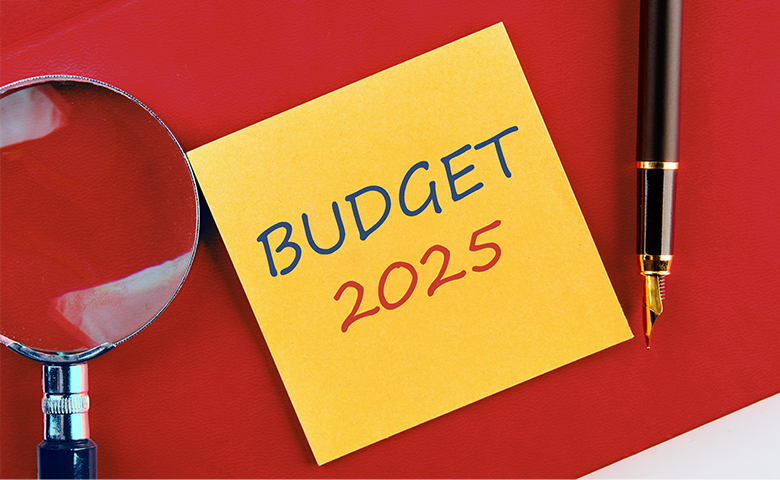Union Budget 2025 throws the spotlight on consumption boost, MSMEs’ growth
By N Jayalakshmi | February 01, 2025
The Union Budget 2025-26 presented by Union Finance Minister Nirmala Sitharaman has by and large received a thumbs-up, with most applauding the expected boost in purchasing power from the announced tax reliefs, and also the measures to support MSME’s - two factors that can drive growth for the retail industry. Here’s a look at some of the responses received by Retail4Growth from industry leaders across categories.

At a time when retailers and brands have been ruing inflation and reduced consumer spends, among other factors, Union Budget 2025 announced on February1st by the Union Finance Minister Nirmala Sitharaman came as a breath of fresh relief.
As the Retailers Association of India (RAI) had said last month while presenting its Pre-Budget Memorandum, “To ensure the growth of the sector, the Union Budget should focus on generating demand and spurring consumption by offering benefits or concessions in the form of lower taxes. It will boost the overall consumer sentiment and benefit the retail sector. Consumption equals to Development. Tax benefits and relief to individual tax payers will increase the monthly disposable income and support consumption.”
Well, it looks like the above need has been met in the current Union Budget, although it is not clear how many of the other things listed out on RAI’s wish-list have been met. But going by the trend so far, most industry players and analysts have given a thumbs-up to Union Budget 2025, particularly with regard to the expected boost in middle class purchasing power with new tax reforms. As Gautam Singhania, Chairman & Managing Director, Raymond Group, says, “The decision to exempt income tax up to ₹12 lakh is a game-changing reform that boosts India's middle class by increasing disposable income. This is expected to drive household spending—an essential growth engine for sectors like retail and real estate. Higher discretionary spending signals economic vitality, fueling consumption-led growth and strengthening market dynamics.”
Agrees Bharat Puri, Managing Director, Pidilite Industries Ltd., "This budget stimulates consumption by enhancing consumer purchasing power, providing a significant impetus to the consumer sector. “
Rajiv Kumar, Vice Chairman - DS Group, echoes a similar thought, “The forgoing of ₹1 lakh crore in direct taxes and full tax exemption up to ₹12 lakh income under the new regime is expected to boost consumer spending, benefiting sectors such as FMCG, automobiles, and retail. The middle class and salaried professionals will have more disposable income, driving demand in these areas.”
Says Nitin Chhabra, CEO, ace turtle, speaking specifically with regard to the retail sector, "The Union Budget 2025-26 brings a significant boost for the retail sector, with measures aimed at increasing consumer spending, strengthening business growth, and improving supply chain efficiencies. The increase in the personal income tax exemption limit to ₹12 lakh will enhance disposable incomes, driving higher consumer demand. Furthermore, employment-linked incentive schemes will create jobs and enhance purchasing power, while reductions in customs duties on key inputs will make consumer goods more affordable. These measures collectively provide a strong foundation for retail and consumer brands, helping mitigate economic slowdown concerns and fueling long-term sectoral growth."
Santosh Katariya, President, CMAI (Clothing Manufacturers Association of India), agrees with the overall sentiment, albeit on a cautionary note, “On the Consumption side, the lowering of Income Tax at various levels will hopefully provide a huge increase in disposable income, increasing consumption. Various changes in the TDS and TCS limits should also give an impetus to consumption. In conclusion, a big Thumbs Up to the Budget 25-26, provided of course there are no twists in the fine print!”
Leading jewellery retail brands too hail the efforts to reduce income tax burden on the middle class. Says T.S Kalyanaraman, Managing Director, Kalyan Jewellers, “The tax reforms proposed in the Budget will ensure that the consuming class will have enhanced discretionary income in their hands leading to a significant demand stimulus. This Union Budget will definitely energise the market sentiment and is another key step to realising our combined vision of a Viksit Bharat!”
On the same note, Amarendra Vummidi, Managing Partner, Vummidi Bangaru Jewellers, says,“We welcome and commend the government’s efforts to reduce income tax for the middle-class households which would facilitate more savings and also increase their purchasing power. This step will make a positive impact on several industries.”
Emphasising the advantage of increasing purchasing power and its benefits, MP Ahammed, Chairman, Malabar Group, further shares, “The budget reflects the government's continued focus on revitalizing consumption, strengthening domestic manufacturing, and fostering job creation. For the retail and jewellery sector, a rise in consumption directly translates into stronger demand, fuelling expansion and employment generation.''
The Budget has also been appreciated for the proposed measures to support MSMEs, who are an integral part of the eco-system surrounding retail. As Nitin Chhabra adds, “Support for MSMEs through collateral-free loans and alternative credit evaluation will empower small businesses, which are vital to the retail ecosystem.”
Speaking about the measures announced for MSMEs in the Union Budget, Vinay Narkar, Partner - Transformation, Financial Services Advisory, KPMG in India, says, “Budget 2025 has focused on improving access of credit to MSME’s. Increasing the guarantee cover to Rs.10 crore from Rs 5 crore for micro and small enterprises will further enable these enterprises, especially in the manufacturing sector who don’t have complete collateral to provide for the loans, to access credit from Banks.”
Overall the Budget has received cheers from most quarters and industry leaders in terms of the perceived focus on balancing growth with self-reliance. As Aadit Palicha, Co-Founder and CEO, Zepto, says, ”The Union Budget reflects a consistent push towards guiding India’s economy with a free enterprise mindset, promoting growth and sustainability.”
It remains to be seen how much of these will translate into tangible gains for brick and mortar retail and the surrounding industries. It is particularly critical, given the impact of Quick Commerce on physical retail, especially in the FMCG space- a trend made evident during the last financial year.









Comments